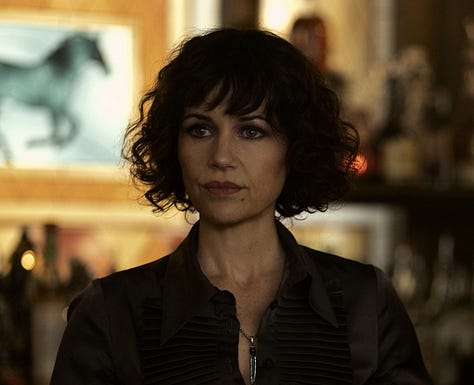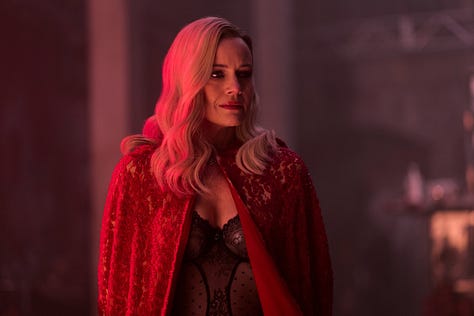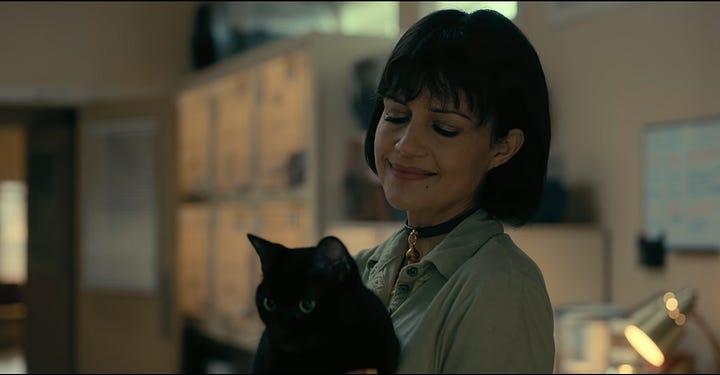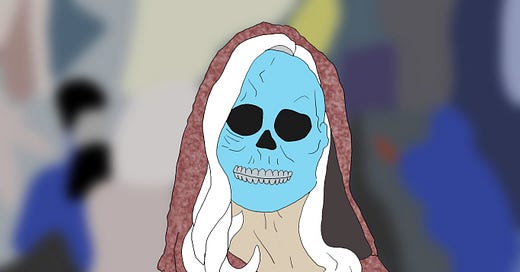The Yearning Rating: ✰✰✰
Romance: ✰½
Sex: ✰✰✰
Storytelling: ✰✰✰
Performance: ✰✰✰
Yearning: ✰✰
Good to see you again :) If you like it here, please consider pledging a subscription — or just throwing us a <3
The teeniest-tiniest spoilers ahead.
Written by Ali Romig
When Mike Flanagan’s The Haunting of Bly Manor was released in October of 2020, I was instantly enamored with the tragic, cheesy, epic love story at its heart. I let the show become my entire personality for a good two months because, 1) it was some of the darkest days of the pandemic and I was desperate to feel; and 2) Victoria Pedretti. So when I heard that Netflix would be adding another queer entry to their Flana-verse with The Fall of the House of Usher, I was thrilled. In a Them piece promoting the show, they called it “[Flanagan’s] spookiest and queerest show yet.” Queerer than Dani and Jamie jetting off to start a new life in America together after meeting only a week earlier? This I had to see!
Eight episodes later, it turns out The Fall of the House of Usher is not Bly Manor 2.0. In fact, it’d probably be more accurate to call it the anti-Bly Manor. Sure, it’s queer, silly, spooky, at times overly-earnest, and has been given the same quintessential Netflix-production treatment, but that is where the similarities end. While Bly Manor emphasized tenderness and community, giving us a ragtag group of lovers who mined resilience through connection, House of Usher focuses on a splintered family who are much more emotionally inaccessible, cruel, selfish and brutal. The queerness here is also of a different variety—and don’t we love queer variety! Instead of sapphic romance, House of Usher is all about queer chaos.
The Fall of the House of Usher is a little bit Succession, a little bit Knives Out, all with a sprinkling of Final Destination. Based on the works of Edgar Allen Poe, most obviously his short story of the same name, the show follows the Usher family, led by patriarch and pharmaceutical magnate Rodrick Usher (Bruce Greenwood). In the first few minutes of episode one, we learn that all of Rodrick’s six children have died within a period of two weeks. This includes, from youngest to oldest, debaucherous Perry (Sauriyan Sapkota), robotic Camille (Kate Siegel, Flanagan’s IRL wife), narcissistic Leo (Rahul Kohli), hubristic Victorine (T’Nia Miller), repressed Tamerlane (Samantha Sloyan), and petulant Freddie (Henry Thomas). Their deaths leave Roderick, his twin sister Madeline (Mary McDonnell, who is rocking a kind of corporate-Gloria Steinem vibe), and his granddaughter Lenore (Kyliegh Curran) as the final Ushers standing. At least, for now.
Because this is Mike Flanagan, House of Usher is structured as a story within a story. After the funerals, Roderick takes himself back to his now-decrepit childhood home and calls upon his oldest adversary, US Attorney C. Auguste Dupin (Carl Lumbly) who has been hoping to bring the corrupt Usher family and their predatory corporation, Fortunato, to justice for years. Roderick tells Auguste that he is ready to confess “to everything”. From here, the show takes us on a wild ride through time, moving quickly between events while simultaneously withholding (sometimes predictable) answers. We see Roderick and Madeline’s grim childhood in the 60’s. We see them try and fail to climb the corporate ladder in the 70’s, sharing a small apartment with Roderick’s first wife, Annabel Lee (Katie Parker), and their two young children. We see the twins on New Year’s 1980, a night that would prove to change the course of their lives forever. We also see the events of the previous two weeks, as each of Roderick’s offspring are picked off one-by-one by a mysterious force. There’s just a lot of retelling and contextualizing happening.
Early episodes of the series offer plenty of jump-scares and set up a plethora of questions that are then left to hang in the air until the finale—sometimes creating suspense, sometimes frustration. Flanagan’s storytelling doesn’t find its footing until the midpoint, when multiple threads begin to satisfyingly coalesce. The pacing, however, remains creeping to the very end (So. Many. Monologues!). If you couldn’t tell from my earlier plot summary, there are a massive amount of characters in House of Usher, and juggling them all proves difficult in terms of actually caring about any of them.
The themes that the show tackles—corruption, greed, egotism—are all well-trodden, and while I am not convinced that this show has anything new to say about any of it, it does a good job of weaving these points into the overall supernatural mystery to keep things entertaining and firmly rooted in the hokey-ness of it all. Unlike Poe’s work, which is mostly known for being dark and romantic, the series is at its best when it luxuriates in its own silliness. (My personal favorite line is a toss up between one of Perry’s partners singing “Wet ass party” to the tune of WAP, or “An idea is a fart your brain makes”...)
All the early reviews that called this show Flanagan’s queerest yet aren’t technically wrong—if my calculations are correct, nearly every character is at least a little fruity. However, I can’t ignore the sense that it’s that vague kind of “everyone’s a little gay” energy that lacks any substantial examination, nuance, or specificity. I’m all for a chaotic, queer mess, but sometimes it is hard to tell the character-revealing moments from the tossed-in bisexual threesomes that this…whole family seem to be partaking in. It’s true that not every queer show needs to be about being queer, but something here didn’t quite ring true. Maybe I am hypersensitive to the fact that the creators aren’t queer (at least that I know of), but at the end of the day, this also isn’t a detail that kept me from enjoying the show for what it was. After all, not all heterosexual stories are entirely accurate in their depictions of sex and love! Just look at Sex and the City :) So yes, the show is surface-level queer, but come to it for a good time, not for authenticity.
In fact, I think the most genuinely queer part of the show has nothing at all to do with sex or love, and is in fact the sheer number of wigs they have Carla Gugino don. Carla’s Verna moves throughout the show detached from space and time, touching each of the Ushers in different and profound ways. Performance-wise, this woman carries the show on her back. I never tired of seeing her pop up unexpectedly (or expectedly, in some cases)—always appearing with a quip and a costume. I’ve loved her ever since she played a mom of two teens in Spy Kids at age 28 (just nearly biologically impossible), and I’ve never stopped. Watch this show for the nostalgic way she wears her eyeliner thick on her waterline, if nothing else.





There is plenty here for old Poe-heads (I believe this is the official fandom name) to swoon over. Ravens, tell-tale hearts, and beautiful, sea-side maidens abound! One of the more self-serious aspects of the show is its handling of the opioid crisis (a relevant topic that has been, IMHO, better dealt with elsewhere). The Usher’s fortune was made by falsely and dangerously marketing their powerful painkiller, Ligodone, as non-addictive. The inspiration for this plot detail may have come from Poe’s life—it was commonly believed he struggled with addiction (however, this has since been called into question)—or possibly from a few small, descriptive lines in The Fall of the House of Usher short story itself. However, even this storyline ends on a humorous note. Without giving too much of the ending away, after Roderick has finished his tale, Dupin gets the last word by telling him that no one actually needs to hear his side of the story. To me, this seemed like an on-the-nose indictment of the many times we as a society have been forced to empathize with those who’ve created or benefitted from an unjust system. And personally, I am over that. Still, it might leave you wondering, “If we didn’t need his story, then why did I just spend eight hours of my life listening to him monologue about it?”
You may wonder that…or you may just enjoy the chaotic ride.










Absolutely! This is such a good point. Like the group sex was meant to show how they can evade consequences? It didn’t feel like it was actually queer in it’s ethos, just trying to be “edgy”
I think I know why it didn’t ring true for me is because the primary reason for their queerness in the narrative is to display their power. To show they are so rich they can be queer without consequences, their group sex more as a signal to their debauchery than to anything else